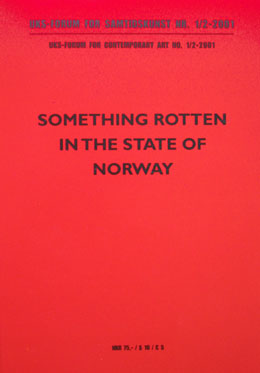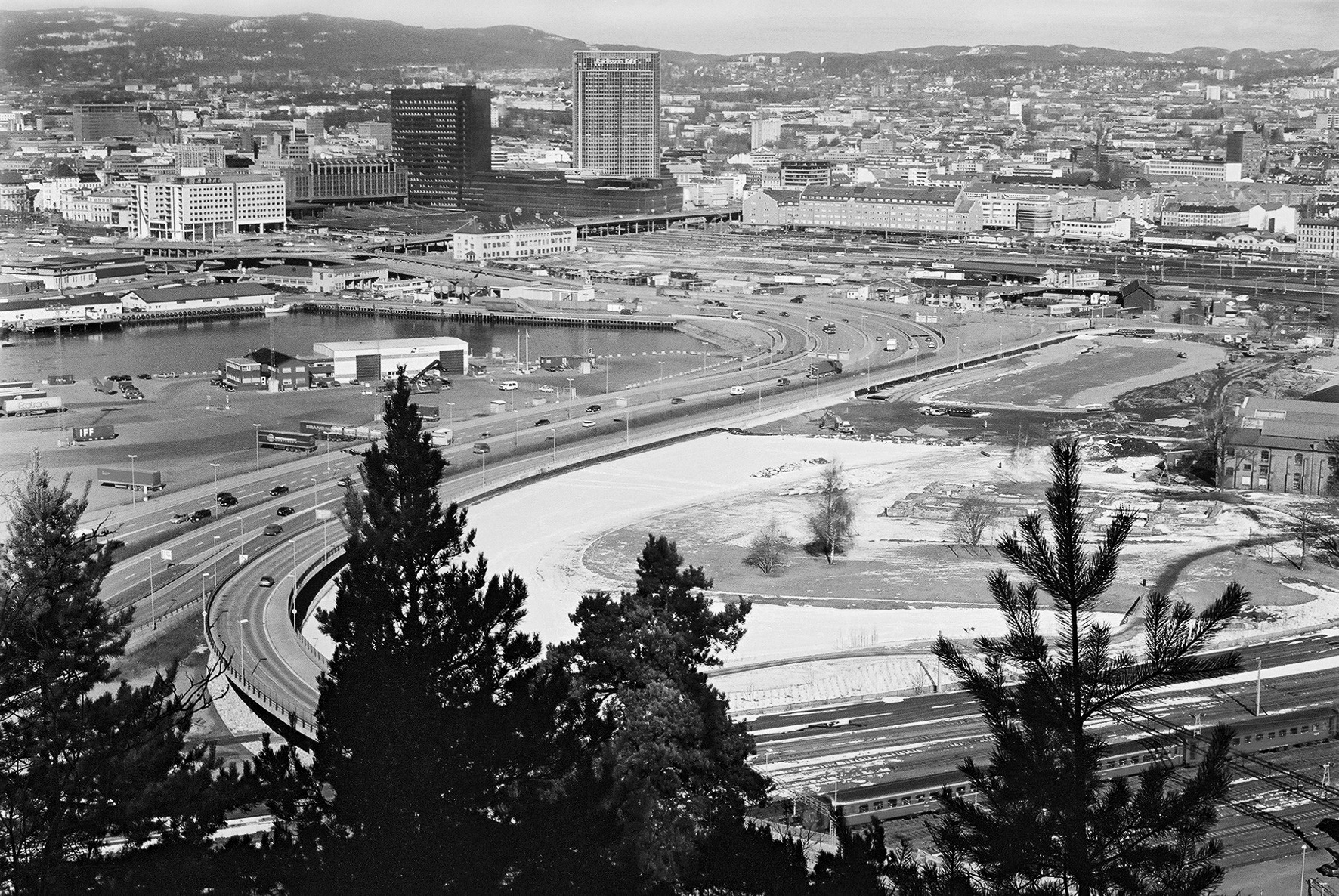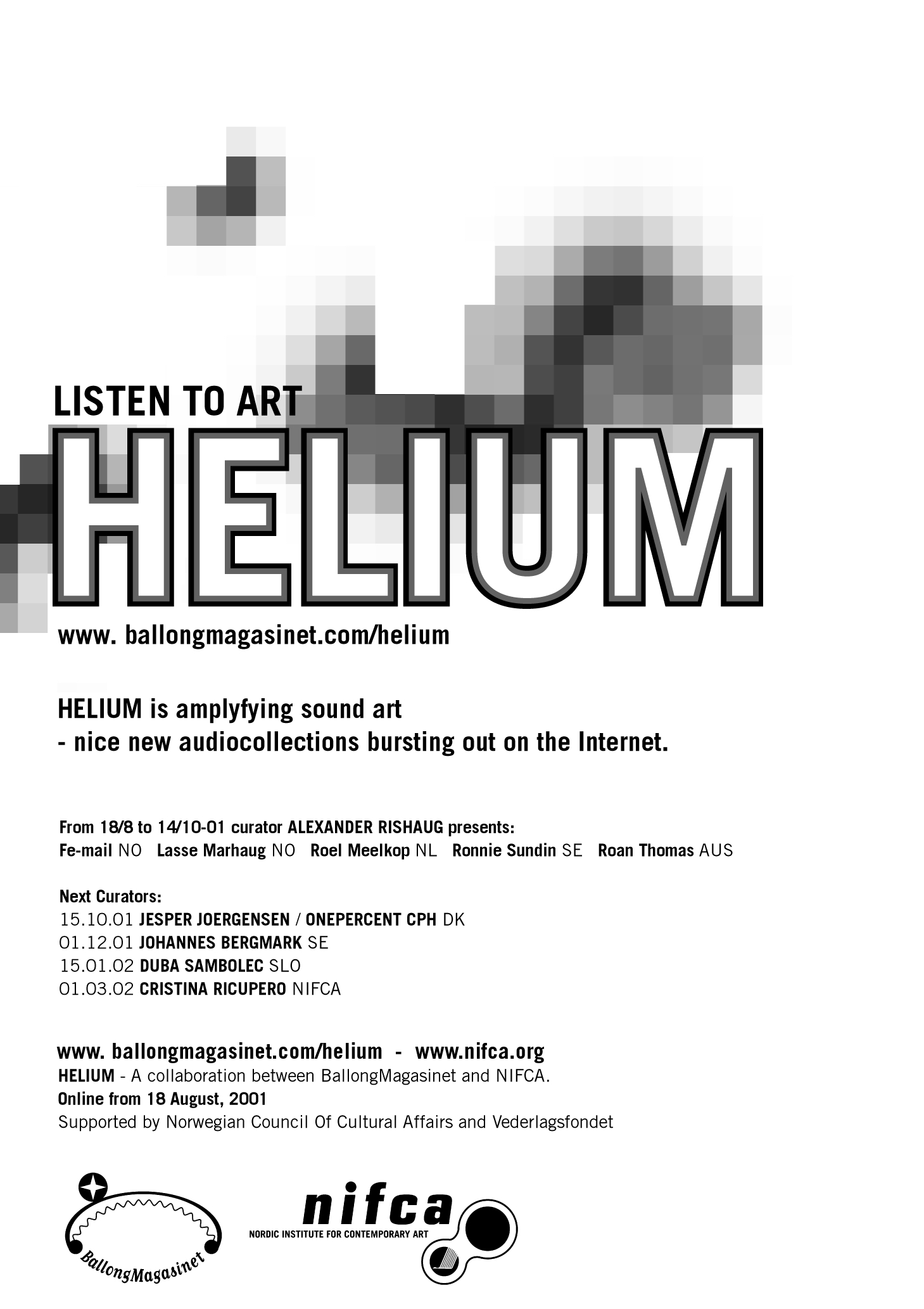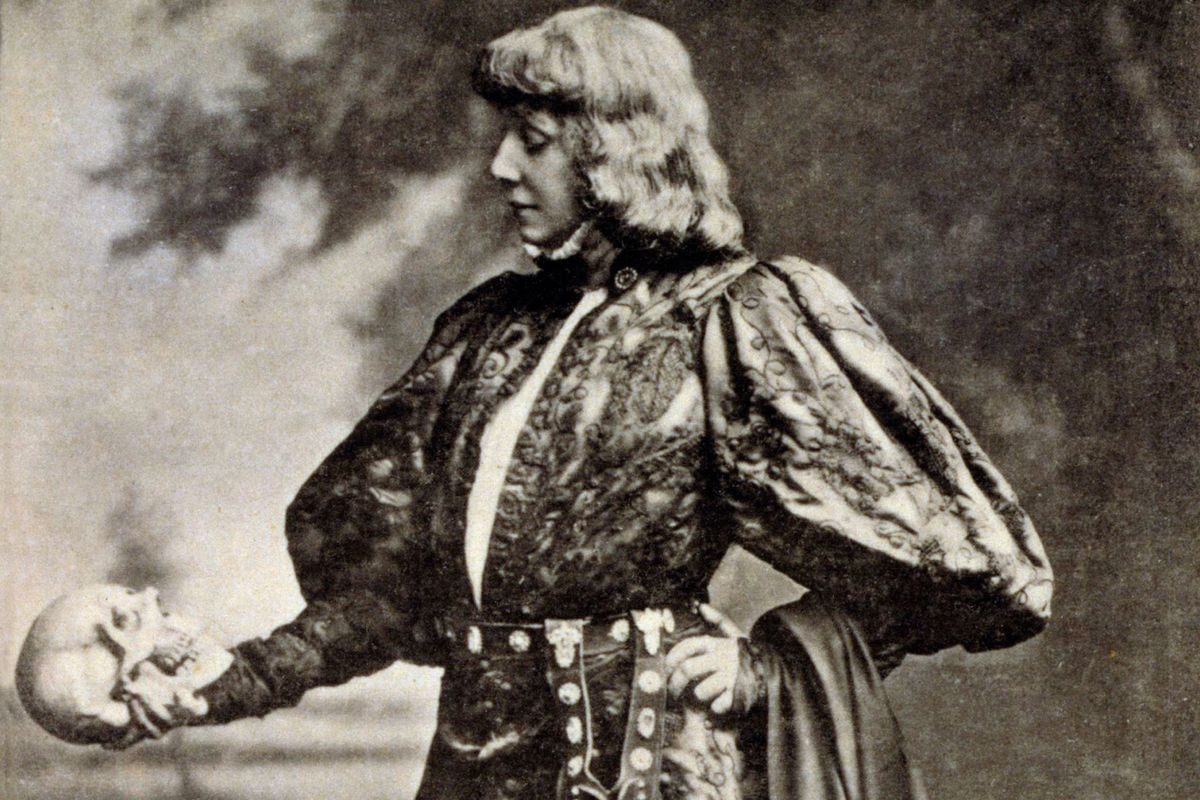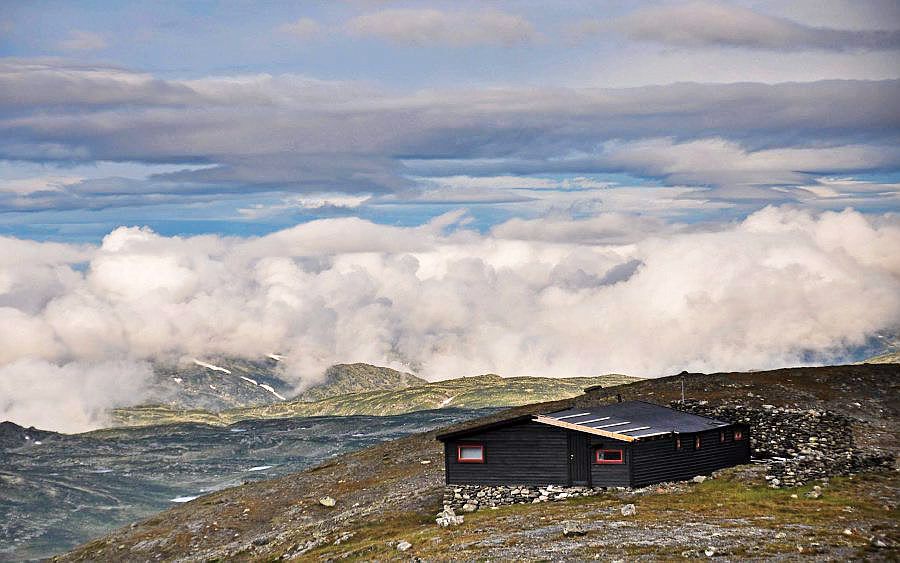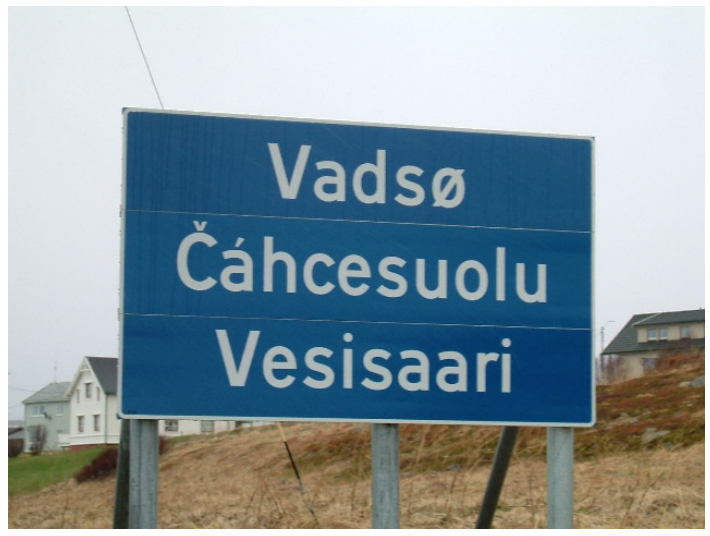UKS - Forum for Samtidskunst 1/2 2001
- Guest editor
What actually is the problem with Norway – a very wealthy country with public poverty and insignificant concentration upon culture?
Kasper König
Preface
In the autumn of 2000 I was asked a question by the German curator and museum director, Kasper König: What actually is the problem with Norway – a very wealthy country with public poverty and insignificant concentrationh upon culture? I owed him an answer.
The basis for this project is personal indignation. In spite of the fact that the this capital in an appropriate manner on behalf of the population. It is not invested in education, either at school or university, the health service is deteriorating, cultural institutions are not regarded as important and become balance sheet items. We have brought about a country that stigmatises and excludes those inhabitants who do not conform to an increasingly uniform and standardised citizenship ideal. In the Norway of today market liberalism is the dominant attitude among the people and leaders. At the time of writing the Right wing surge is in the process of sweeping away good working conditions and rights that artists have previously struggled to win for themselves.
What power structures and trends percolate through this nouveau riche years ago, slept in cupboards” and was one of the countries that “later than all the others (...) took the art of sculpture and painting to itself”? Walther Benjamin: The Nordic Sea, The Work Of Art In The Age Of Mechanical Reproduction, Gyldendal 1991
This issue of UKS-forum: Something rotten in the state of Norway has taken upon itself the aim of bringing material from sociological research into what, at times, is our closed and non-political art world, in order to throw light onto some of these structures. The objective is to draw the critically minded closer to the critical practitioners. The texts address different areas of social life, but one criticism constitutes a common denominator: The peculiarly Norwegian paradox of state wealth – public poverty.
Visual artists are public protagonists in line with other cultural workers. Artists assume positions in relation to their surroundings and take a point of departure in them when they work. They subject their creations to public scrutiny. The expectation of the public understanding and identifying themselves with the works of art, is high. But where, in fact, is the artists’ social commitment outside of the art institutions? Artists are preoccupied in being taken seriously, but how well do they gauge the temperature of the society in which they operate? In order to have a real prospect of being an active part of the public domain, one needs insight into the various discourses and the social criticism that are produced by researchers and intellectuals. presents ten texts about Norway. The articles have asked them to point to what is rotten in the kingdom of Norway, as seen from their respective standpoints. In addition the artist Mike Bode presents part of his contribution to the UKS biennial 2001, by means of a text written by Steffan Schmidt.
This material will hopefully be of interest to the informed public; those who represent the visual artists’ public. The content is no less relevant to readers abroad who may have some vague impression of what Norway is. With Something Rotten in the State of Norway the intention is to diagnose one of the world’s richest countries, a country that – until recently – presented its artists abroad with that evocative title No..Art.
I would like to thank all the authors for their interest in this project and those who have worked on Something rotten in the state of Norway: Bjørn Bjarre, David Parton, Brit Henschien, Ane Hjort Guttu, Johan Urban Bergquist, Hedevig Anker and last, but by no means least, Anne-Britt Gran who has read and commented upon all the texts and who has been of great help.
Terje Nicolaisen, 10 August 2001
__________________________________
From Fortinbras to Croesus:
- the Crisis of Proximity in Norwegian Social Democracy
Nina Witoszeck
In the finale of Shakespeare’s Hamlet, we recall, the palace of Elsinore is full of corpses, the King, the Queen and their entourage have been exposed as a bunch of murderous crooks, Hamlet himself is dying, and the state of Denmark is in a total shambles. The ultimate winner is Fortinbras, a valiant Norwegian prince who has just arrived from the Polish wars. Unlike extravagant, vacillating and neurotic Hamlet, Fortinbras is a pragmatic, strong-willed and no-nonsense soldier. In an "Elegy of Fortinbras" I learned at the gymnasium, the Polish poet Zbigniew Herbert is clearly fascinated by the way in which the Norwegian warrior takes control of the "rotten state" of Denmark:
Adieu prince I have tasks a sewer project / and a decree on prostitutes and beggars / I must also elaborate a better system of prisons / since as you justly said Denmark is a prison / I go to my affairs This night is born / a star named Hamlet We shall never meet / what I shall leave will not be worth a tragedy.
Shakespeare, as usual, was clairvoyant. When I first came to Norway in the early ‘80s I had a distinct impression that I had arrived in the robust Kingdom of Fortinbras. The people were unromantic, frugal, and wary of the evils of the city. Intellectuals still preached the Spartan virtues of Maoism and Marxism, cultivated a somewhat "vegetarian" style of thinking and had neither time nor taste for savoir faire, buffoonery or Europe. The government was peddling "capitalism with a human face". Politics was relatively easy to make sense of: The defining mantra of the Left said "public good private bad", and the Right said roughly the opposite. Arne Næss was preaching the gospel of Nature from his hytta in Tvergastein. Norway was closed at week-ends.
Some twenty years on, Fortinbras’s kingdom has become an example to the rest of the world – at least according to a United Nations Report. On the surface of things, the glorious legacy of the old noble warrior lives on: The ruling party talks endlessly about "community", "solidarity" and "welfare." It aspires to be progressive and close to the people (with Jens and Thorbjørn as your mates). It modernises, effectivises and rationalises. But the old Fortinbrassian pragmatism is neither left wing nor right wing, nor any wing. The "good" people are no longer so good. Cultural radicals are no longer radical. The public sector is no longer so public. The welfare state is not quite about welfare. Capitalism with a human face has become capitalism with golden teeth. The Labour government has taken to heart a life-ambition of Pablo Picasso: "I’d like to live like a poor man with lots of money." The people are not impressed.
Like everywhere else, there is a section of the population that wants to be unashamedly rich, i.e. indulge in doing things which are either immoral, illegal or fattening. The majority, however, struggles to make sense of an astonishing anti-climax to the Norwegian fairy tale: now they’ve got their wealth, their kingdom and their princess, they are not allowed to enjoy it. One newspaper column boasts: "Norway: world's best country to live in" Another screams: "Waited 9 hours for ambulance: my wife could have been alive" . The first page proclaims: "Norway escapes world economic crisis". The second laments: "No money to buy books for the University Library". "Patients Suffers". "Schools decline". "Railroads in a Shambles". And so on, ad infinitum. I have witnessed these jeremiads before – in 1980s, when socialism in eastern Europe was falling to pieces.
There is no doubt that the ocean of paradoxes and contradictions in the poor-rich Norway is partly due to the political shifts evident everywhere in the globalising world and described eloquently by Anthony Giddens or by the publications of the Norwegian Maktutredning. Rather than rehearsing them, I’d like to consider one more facet to the seeming post-Fortinbras decline of Norway. It has to do with being rich, which is not just a material but a metaphysical state. Becoming wealthy is accompanied by an array of transformations which involve the creation of a particular set of conventions, ways of expression, modes of perception, standards of taste, social ideals and ambitions, and ways of governing people. These things need to mature and stabilise, get into people’s blood circulation.
The "unnaturalness" of the Norwegian journey from rags to riches is that it has taken place in a democratic age, in a strongly democratic country and within the space of twenty years. There has been no aristocracy, no bourgeoisie to speak of, no greedy clergy, not even a Mafia (in the proper sense of the word) to appropriate and manage the wealth, and set, hone and develop standards of being well off. There is a community of former peasants and fishermen who have learned how to live in luxury mainly from American movies and books. An ethos which cherishes extravagance, social contrasts and distinctions and emphasises manners and class, clashes with the old Fortinbras philosophy of caution, frugality and authenticity – and with feeling guilty about being rich. The "performer principle" – promoting action, spending, adventure - quarrels with the "possessor principle" encouraging to hold on to what one has and keep it for the black hour. As a result there is what looks like both a movement and a paralysis, a boom and a hastened, premature decadence. As a matter of fact, there is both prosperity and decline all at once.
The current crisis – if there is a crisis – in the Kingdom of Norway has to do with distance. The old Fortinbrassian party fought for a Norway in which the distance between different social groups, the people and the rulers, the centre and periphery, the real and imagined self, was to be reduced to the minimum. This was, for a long time, the political and social ideal. Wealth does not necessarily diminish distance – but too much of it does. The Norwegian crisis, then, is a crisis of proximity, stemming from the difficulties in acquiring a new right distance to wealth, to the rulers, to the necessary reforms, to the New Rich Self. At the risk of oversimplification, let me use a shorthand way to suggest some of the ways in which the crisis of proximity affects life in the Kingdom of Norway at the dawn of the new millennium:
So called "masses": The masses, uniquely in Europe, are accustomed to more or less equal distribution of resources so, logically, they demand equal distribution of wealth NOW. Both Høyre (the Right) and Fremskrittpartiet (Party of Progress) have tried to prey on just this expectation. But there is more side to the masses’ aspirations. Norway wants to be like America, only more just, of course. The elites’complaints about Americanisation need to be revalued in this light. It is not Macdonald’s and Coca Cola that are the real agents of American culture. The most insidious form for Americanisation embraced enthusiastically by the masses is the approved un-culture of exhibitionism launched by "reality TV" and media paparazzi. Nothing is more American than the perception of life as an incessant competition for fame and Mammon, a struggle for being watched and admired while being/gettting rich and famous. Such perception – since it obliterates the distinction between the private and the public, the real and the imaginary – inevitably leads to the loss of distance to the Self.
So called elite: As everywhere else in the world, there are two kinds of the post-Fortinbras elite. The first group, a Yuppie International, know how to deal with computers, cellular phones, and currency exchange, and operate in the offices, boardrooms, and hotel suites in which international business is transacted. The second can be called, after John Berger, a "Faculty Club International". It is carried by well financed academic networks, governmental and nongovernmental agencies and foundations. The difference between the Yuppie International and the Faculty Club is that the first believe that all good things, including human rights, will eventually result from the global establishment of successful market economies. The second group is critical of global capitalism and cultural imperialism and believes in local knowledge, constitutional nationalism, and global solidarity. The similarity between the Yuppies and the Faculty Club is that both are closer to the elite from Manhattan or Hong Kong than to the disgruntled northern fishermen in Vadsø.
Politicians’ idols: From times immemorial politicians have been actors. Today, however, with the help of the media, politics has become theatocracy, to use Nietzsche’s term. It is not the contents of the political message which count any more (the contents are similar in all parties anyway): it is the use of ear-catching slogans, the ability to flirt with the media, the theatrical talent, which win. A commentator in Aftenposten writes nostalgically: "I dream of the old times where we could just listen without looking... the times when the distance made it possible to fully concentrate on what was said. With no politics and no mimics thrown in".
Reforms: Every time the government says "reform", one hears coded "confusion," "uncertainty" and "one more rule/tax to put up with". Clearly there is a growing distance between words and action. The situation calls to mind the old communist joke (or was it real-life story?), where a zealous, perestroyka-driven Minister looks around very pleased with himself and says: "Now, we’ve reformed the government, the parliament, health service, education, transport and city councils. I wonder what else we can screw up?"
The People's rebellion in the North: The North has a reputation of being the realm of chronic malcontents, barbarians and idlers. It is tempting to see The Public Rebellion against the Labour Party staged in Vadsø and Bodø in the Spring of 2001 as spectacles of collective therapy or as the usual liturgy of whinging and whining cast in a juicy coastal idiom. But the "rebels" were clear about why they mobilised: they had enough of changes that were imposed from the top, without much consultation with local inhabitants. They argued that they were not "against change, only against being changed by others". They objected to being victims, state clients, eternal recipients of alms. A striking novelty about this insurrection was that it was organised by women, well-educated working mothers infuriated by the fumblings and mumblings of their "Hamletic" government. "Vi har alt som trengs for å skape gode samfunn, så slutt å motarbeide oss, herr Stat," We have everything we need to create a good society, so stop working against us, Mr.State", they declared. It is here, in the North – the archetypal region of extremes - that the growing distance between the People and the State has been most evident at the beginning of the 21st century.
Labour Party’s idols: The best illustration of what has happened to the Norwegian Labour Party is, once again, the folkeopprøret in the North. After a trauma of tackling the February comeuppances in Vadsø, the Prime Minister decided not to confront the rebels in Bodø, sending instead his representatives. What was striking about the Statesmen and women who appeared before the people was that they were stunningly beautiful, young, rational, eloquent and confident – indeed they looked like clones of the Prime Minister himself. They didn’t really know what their Party wanted but they were prepared to go through hell to get it. They projected statistics and diagrams on the screen proving that the rebellion was a malade imaginaire because financially, Northern Norway was much better off than the South. One of the rebels summed up the distance between the Labour Party and the people: "You are talking about statistics, we're talking about our lives"
As Herbert’s poem put it, life in the Norway of Fortinbras is not "the stuff of tragedy." But it can easily become a cheap moral farce, illustrating, for the umpteenth time, the old-new maxim that money won’t buy happiness. But, in this case, it will certainly pay the salaries of a large research staff to study the problem.
Nina Witoszek is a cultural historian and fiction writer. She is the author of Fables of the Irish Intelligentsia (1991), The Loves of Faustyna (1995), Norske naturmytologier (1998) and The Postmodern Turn: East and West Perspectives (1999).
